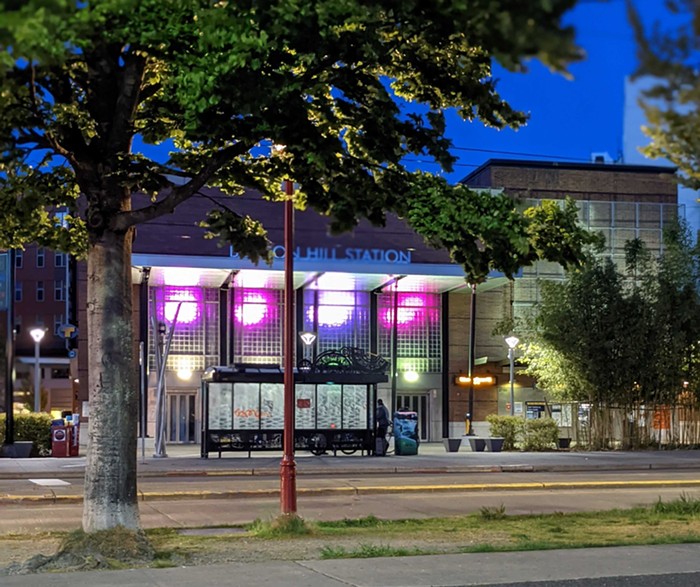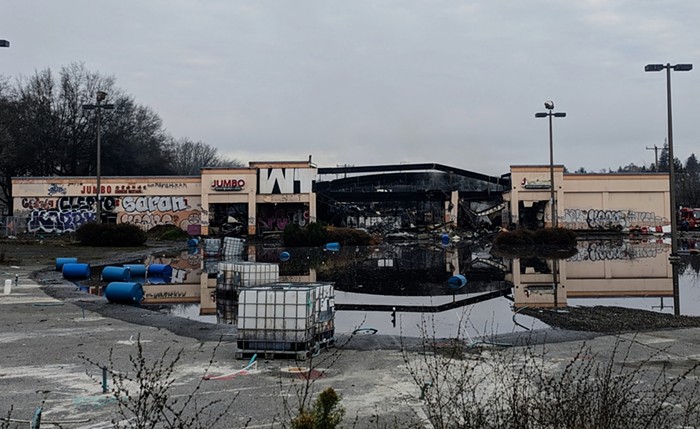
This past Sunday night, about 30 people gathered at the Cloud Room for an event called “Homelessness: The Solutions Dinner.” Outside, about 3,000 people prepared to sleep unsheltered on the streets of Seattle, while thousands more checked into emergency shelters.
The evening at the Cloud Room was scheduled to include a "Fireside Chat and Family Supper” (also described as a "participatory feast") for $30 per person. All proceeds were pledged to Mary’s Place, a local network of shelters for homeless women and families. But the event—subtitle: “Facing the tragedy, imagining the solution”—was not really about fundraising. As people across all classes in Seattle begin to wake up to the crisis of homelessness, everyone is trying to figure out what they’re supposed to be doing about it. City government is spending more money. Angry neighbors are demanding more police. Amazon is donating a building. Designers are "getting creative." And here, in a deluxe new development on Capitol Hill, the Cloud Room’s membership wanted to talk about it too.
According to the invitation, the night came about after a "dialogue about the things we love most about Seattle and our most passionate grievances," in which the Cloud Room's members "reported their number one grievance with Seattle is homelessness."
The Cloud Room is a members-only co-working space in Capitol Hill's recently opened Chophouse Row. Memberships cost $300 to $600 a month; the space has, in addition to standard office accoutrements, a full service coffee and cocktail bar, a white grand piano, and an "Astrologer in Residence.”
“The Solutions Dinner,” which was open to the public, was to be the second installment in a series called #GoldenRepair, a reference to kintsugi, the Japanese practice of fixing broken pottery with a lacquer made with powdered gold—a way of celebrating instead of hiding the damage. The Cloud Room's creative director, Michael Hebb—who, according to his online bio, "believes that the dinner table is one of the most effective, yet overlooked, vehicles for changing the world”—told the group, "We actually want to enact golden repairs on areas that we think Seattle needs in order to be what it actually can be."
"I do want to mention the irony of being up here in a fancy place having a dinner about homelessness," Hebb said. "This is us educating ourselves so that we can think about solutions." Liz Dunn, the influential Capitol Hill developer behind Chophouse Row, sat on a white shag rug and added, “We approach this topic with utter humility.” (It's possible this acknowledgment of irony was just for the benefit of those of us in the room conspicuously taking notes.)

The pre-dinner "Fireside Chat" featured Rex Hohlbein, an architect who left his day job to found Facing Homelessness, a project that attempts to get housed people to treat homeless people more like human beings. Hohlbein's origin story involves spontaneous conversations with homeless people living near his office and leaving his day job to serve the homeless full-time. And Facing Homelessness does do some good work gathering tents, socks, and other supplies to give directly to people experiencing homelessness. But his main goal at the Cloud Room was convincing the crowd to “just say hello” to people living on the street. Even when he doesn’t buy Real Change, he said he makes a point of shouting “I love Real Change!” to vendors he passes on his bike. Even when he doesn’t give money to someone standing on a freeway off-ramp, he tells them, “You have a great smile!”
"This is not just about doing something for people that are suffering on the street," Hohlbein told us. "This is about making yourself a fuller, more beautiful human being that can listen to your empathetic voice."
He asked the room if we were prepared to make three commitments.
1) Can you say “hello” to people you see living on the street?
Almost everyone raised a hand.
2) Will you buy Real Change, if you don’t already (or at least engage with the vendors)?
Sure.
3) Would anyone present be willing to put a 175-square foot shelter in their backyard? And would they be willing to rent that shelter to a formerly homeless person for $450 a month? The room was silent. What if they knew the person was vetted through a nonprofit organization and had no drug addictions? What if the person was the woman whose photos he’s projected on the screen, along with her one-year-old daughter? “She would love to live in a community with all of you,” Hohlbein said.
There were no takers. Hohlbein’s proposal was a mix of reality and hypothesis—at once the most concrete suggestion of the night and a calculated demonstration of the limits to our compassion. Somehow, the room felt even more awkward than before.
"Thank you all for listening," he said. Event co-presenter James Keblas came to the mic and exhaled. “Rex,” Keblas said. “Powerful.”
The "very simple vegetarian feast" by candlelight followed. (The food, prepared by Hebb, was fine: a shaved asparagus salad, roasted vegetables, mashed potatoes, lentils. The wine was pretty good.) Over the salad, we were asked a set of prepared questions.
"What is your favorite room in any house anywhere?"
"Have you ever wondered where your rent money was going to come from?"
"In three words, how does it feel to have a home, waiting for you, with a warm bed, and a door that locks?"
"Some cultures believe that any stranger could be a god or prophet in hiding, and hence open up their houses to strangers, offering the best room and food. While this is a far cry from today’s world, how could you more powerfully see the god in every human?"
Intentionally or not, the questions steered us away from practical, political engagement and toward a discussion of our feelings about homelessness.
An event planner for Amazon said she was temporarily (and voluntarily) homeless in the 1990s to rebel against her wealthy parents. Now, she finds the idea of being homeless "terrifying.” Whenever she has food leftover from a work event, she takes it and drops it off under the Ballard Bridge. She planned to email other event planners at work and suggest they do the same.
A woman who doesn’t “believe in” health insurance said she also doesn’t believe in inviting strangers into her home. The problem, she said, is that then you have to get rid of them, and they don’t want to leave. “No good deed goes unpunished,” she said.
A food writer who during the recession lost her home and couch-surfed shared openly about the humiliation of not having enough money.
Hebb said he once lived in an Airstream trailer. Later, he mentioned working on a book proposal during this time.
We all agreed that we have little idea what it is really like to be homeless and living on the street.
At my table (one of three), several diners expressed a desire to donate food, clothes, and sanitary products to homeless people. Few of them appeared to be aware of the many social service agencies in town already doing that work. No one raised the possibility of lobbying state lawmakers to spend more on homelessness or campaigning for this fall's housing levy, which will double the property taxes raised to build housing for low-income and homeless people. We did not talk about how often politicians have responded to financial downturn by slashing housing and mental health services or how we have yet to recover from those cuts. The conversation, like the meal, was curated.
As dinner wrapped up, each table shared its takeaways. They pitched corporate funding of shelter beds, events where homeless and housed people share a meal or coffee to "reduce stigma,” programs allowing donors to "sponsor" a homeless person, and a "welcome wagon" to "set standards for the compassion and empathy" the city expects from newcomers.
At one point, the food writer at my table wondered aloud why nonprofits in town don't list online the things they need donated. Hohlbein told her "it's an easy phone call," but that he would pass along the suggestion. "Or even if I got a text that said that," she replied. "I could send an Amazon Prime shipment.”
Three hours into the event, as everyone eyed the exits, a few things remained unclear: Will any of the proposed “solutions” actually happen? Without a more substantial commitment to actual political involvement, how helpful will any of those suggestions be? Does discussing a problem truly lay the groundwork for eventual action or leave participants feeling like they’ve already done something to help simply by showing up?
What was perfectly clear was where we sat that night in relation to Seattle’s homelessness crisis: inside an expensive members-only clubhouse, eating a “participatory feast,” and discussing our own interpretation of the plight of thousands of people with few resources and little food, some of whom were sleeping mere blocks from where we sat. Not that we could see any of them from inside the Cloud Room.


















